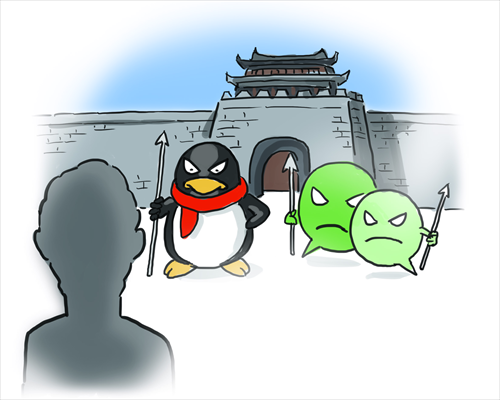HOME >> OP-ED
Zuckerberg faces competitors in China
By Rong Xiaoqing Source:Global Times Published: 2014-12-18 21:03:01

Illustration: Liu Rui/GT
The relationship between China and Silicon Valley has often been bumpy. From the copyright conflicts of past decades when most Internet users in China used pirated Microsoft software to the more recent skirmishes over Internet censorship and Google's effective banishment from the country, ties have rarely been warm and fuzzy. But it seems China is making at least one new friend from Silicon Valley, Facebook's founder and CEO Mark Zuckerberg.
The 30-year-old billionaire has been acting like a college boy in love with anything Chinese recently, and this goes well beyond his Chinese-American wife. He has been rolling out one stunt after another in his wooing of China.
In October, Zuckerberg held a dialog with students from the School of Economics and Management at Tsinghua University in Beijing, where he was recently named a board member. In a 30-minute talk in Chinese, which Zuckerberg has been learning, he promised to hire more Chinese students to work at Facebook and help Chinese cities to set up Facebook pages to promote themselves.
His Chinese is far from perfect. But when combined with his golden boy smile, it was more than enough to impress the audience who interrupted his speech frequently with cheers and clapping.
Then earlier this month, Zuckerberg met Lu Wei, director of China's State Internet Information Office, when Lu was visiting the US. The media reported that Zuckerberg not only greeted Lu in Chinese, but also placed a copy of Chinese President Xi Jinping's book The Governance of China on his desk. Zuckerberg also told Lu that he bought copies for his executives as well to help them understand "socialism with Chinese characteristics."
Zuckerberg was not the only Silicon Valley guru who met Lu during his visit. Apple's CEO Tim Cook also hosted a meeting with him. But unlike Apple, which has been enjoying huge profits in China, Facebook has no operations in the mainland. Access to Facebook was banned in 2009 after a riot in Xinjiang that led to the deaths of close to 200 people. The Chinese government claimed the riot was instigated on foreign social media platforms. Now Zuckerberg's wooing has stirred up speculation over whether Facebook will be allowed back.
It is clear that Facebook is coveting the China market. Who wouldn't when the country has more than 642 million Internet users? It's also possible that Lu may have sent out a friendly signal by meeting with Zuckerberg.
Clearly, Facebook and Zuckerberg will have to reach a compromise with the Chinese authorities to get back in, as a completely unregulated Facebook won't pass muster in Beijing. But, and this may surprise some investors, the biggest challenge Zuckerberg may face in going back to China may not be from government regulations but from indigenous competitors.
When Facebook was banned in China, there were no Chinese players able to compete with the giant. Facebook, with 1.35 billion users, may have grabbed half of the Internet users in the world. In China though, half of its Internet users have been swiped by WeChat, a product that a company called Tencent launched only four years ago.
WeChat has a competitive technological edge over Facebook. It has almost all the functions of Facebook and WhatsApp, the instant messaging platform that Facebook purchased earlier this year. But it has many more, such as ways to use the site to pay checks, call taxis and give friends a video call.
The most formidable quality of WeChat might be that it is the first social media platform that gathers all Chinese, in China or overseas, together. This unique power is becoming clearer every week.
For example, when Doug Lee, a Long Island-based Chinese businessman who had never tried politics before, ran for State Assembly earlier this year, Chinese voters in his district mobilized via WeChat to help him. Lee lost. But he won 40 percent of the ballots against his incumbent opponent, quite an impressive result for a rookie candidate.
And when Ji Xinran, a Chinese student at the University of Southern California, was murdered this summer in a robbery close to the campus, Chinese living in California organized via WeChat to help her parents fight for justice.
Earlier this month, a desperate father in Beijing who was looking for a rare drug to treat his dying daughter posted a message on WeChat. Hundreds of strangers got involved. The drug was purchased in Singapore and brought back to Beijing. All of this happened in 24 hours.
Zuckerberg knows of WeChat. At the event at Tsinghua University, he mentioned that China has many creative companies. "Tencent's WeChat is also big. Some Chinese use WeChat and QQ (another instant messaging app of Tencent)," said Zuckerberg.
He said this in Chinese. It's hard to tell whether by saying "some" he meant "many." But if Facebook really makes inroads into China, he could learn the difference between the two words in the hard way.
The author is a New York-based journalist. rong_xiaoqing@hotmail.com
Posted in: Viewpoint, Rong Xiaoqing